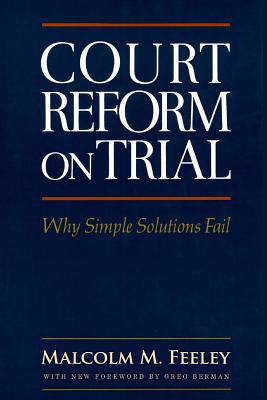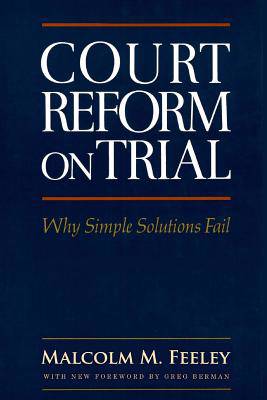
- Retrait gratuit dans votre magasin Club
- 7.000.000 titres dans notre catalogue
- Payer en toute sécurité
- Toujours un magasin près de chez vous
- Retrait gratuit dans votre magasin Club
- 7.000.000 titres dans notre catalogue
- Payer en toute sécurité
- Toujours un magasin près de chez vous
Description
COURT REFORM ON TRIAL is a recognized study of innovation in the process of criminal justice, and why it so often fails-despite the best intentions of judges, administrators, and reformers. The arc of innovation to disappointment is analyzed through such programs as bail reform, pretrial diversion, speedy trials, and determinate sentencing. A much-maligned system of plea bargaining shifts power to prosecutors away from judges, and formal trials recede in importance-but is that really the problem? Perhaps failure lies in unrealistic expectations, splintered systems and decisionmaking, waning political will, unempowered constituencies, and reformers' hubris. Feeley analyzes the persistent failure and proposes insightful pathways out of the cycle. First commissioned as a study in the influential Twentieth Century Fund series, the book is accessible for today's readers as part of the Classics of Law & Society series of Quid Pro Books. It adds a reflective preface by the author and a new foreword by Greg Berman, Executive Director of the Center for Court Innovation. Calling it an "intellectual touchstone ... brimming with energy not resignation," Berman writes that the book "has all of the hallmarks of Feeley's best work. Lucid prose. Idiosyncratic analysis. A willingness to speak truth to vested interests. And a commitment to describing the way the world actually works from a ground-level perspective-as opposed to the official versions of how systems theoretically should function." "The world has changed a lot and not at all" since the book was first published, Berman adds. "What is striking reading COURT REFORM ON TRIAL again in 2013 is just how relevant it still is.... The number one reason why it should still be required reading for anyone who wants to help our justice system improve is the book's relentless focus on failure." As U.S. District Judge Jack Weinstein noted (as to the first edition), "At last the intelligent layman and lawyer have a sophisticated but easily understood analysis of what can and should be done to improve the administration of justice in the United States. What a welcome relief from the demagoguery that permeates most public discussion of the problem." In reviewing the book in the California Law Review, Judge William Wayne Schwarzer stated: "Public interest in other issues waxes and wanes, but court reform has constituencies that never seem to tire. Feeley's book offers an interesting and insightful panorama of efforts to reform the criminal justice system." Those constituencies, and thoughtful readers in many fields, will enjoy a fresh view of the panorama. Using a modern presentation and adding the new introductions, the Quid Pro edition maintains continuity with previous printings by embedding the original pagination; this feature facilitates referencing and classroom assignment-and permits matching, usable pagination in the new ebook edition.
Spécifications
Parties prenantes
- Auteur(s) :
- Editeur:
Contenu
- Nombre de pages :
- 204
- Langue:
- Anglais
- Collection :
Caractéristiques
- EAN:
- 9781610272025
- Date de parution :
- 24-07-13
- Format:
- Livre broché
- Format numérique:
- Trade paperback (VS)
- Dimensions :
- 152 mm x 229 mm
- Poids :
- 281 g

Les avis
Nous publions uniquement les avis qui respectent les conditions requises. Consultez nos conditions pour les avis.






